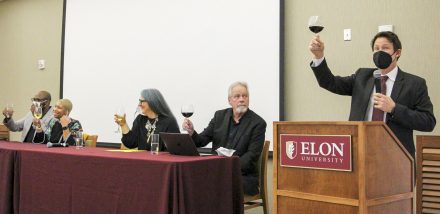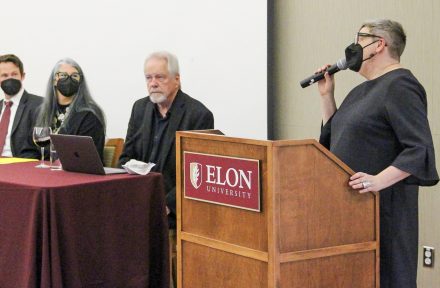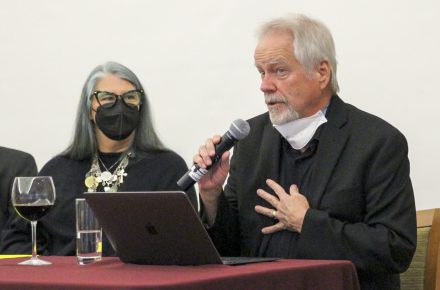Faculty gathered Monday night to reflect on the center's origins and successes in creating space for interdisciplinary study involving religion.
In the decade since the Center for the Study of Religion, Culture and Society was founded at Elon, it’s become a hub of scholarship, exploration and dialogue.
Religious thinkers, writers and scholars regularly give lectures and presentations there reflecting on religion’s influence and our understanding of it. It hosts the biennial On the Edge symposium, which draws interdisciplinary scholars from around the world and results in scholarly publications. Undergraduates in the Multifaith Scholars Program, welcoming its sixth cohort this spring, spend two years investigating religion across communities and cultures through mentored research. And it hosts Elon faculty scholars whose research intersects with religion to inform campus and center activities.
In short, it’s met its mission.

“Before there was a center, there were meetings in the PERCS (Program for Ethnographic Research and Community Studies) room. I remember Professor of Religious Studies Toddie Peters’ passionate plea for a center of multifaith dialogue that was also an academic center and a place for faculty scholarship,” said Associate Professor of Art History Evan Gatti. “We saw the possibility of a bigger dialogue and what that dialogue could look like. We started dreaming. A lot of those things happened.”
At a reception marking the center’s first 10 years Monday night, faculty involved in the center’s founding and function reflected on their experiences. Panelists included Gatti, Professor Emeritus of Religious Studies Jeffrey Pugh, Associate Professor of Psychology Buffie Longmire-Avital, Assistant Professor of History Waseem bin Kasim, and former Elon Professor of Anthropology Tom Mould, now at Butler University.
The center was established in 2012 with Professor of Religious Studies Lynn Huber serving as director. She describes her role in those first years as urging faculty toward the center’s missions until a full-time director could be hired. In 2014, Professor of Religious Studies Brian Pennington became the center’s director.
“I inherited a center that was already positioned as a site for connection,” Pennington said. “This place is about bringing people together.”

The center is designed to connect faculty whose work overlaps with religion for new ways of understanding the world. Just to scratch the surface, history, art history and geography; sociology, anthropology and psychology; language, communication and the arts all inform or are informed by religious issues.
Outgoing scholar in residence Assistant Professor of Geography Sandy Marshall’s research concerns human migration, particularly in the Middle East and at the U.S.-Mexico border. Incoming scholar Kasim will spend the next two years researching the ties between religion and medicine in Africa, tracing the influence of Christian missionaries on Muslim populations.
“I want to show the ways religious communities in Africa and West Africa interacted over the years and find out how Christian missionaries were able to get inside Muslim societies, especially through health, healthcare and healing,” Kasim said.
Longmire-Avital described the center as a place to explore how race and religion are intertwined. “In attempting to understand the story of the Black experience in America, you can’t do that without talking about religion and how religion intersects so much with ways we understand race,” she said. As the founding director of Elon’s Black Lumen Project, Longmire-Avital wants to strengthen connections to area churches that have historically supported Elon’s Black students.
Pugh recalled his early days as a religious studies professor when Elon’s then-Department of Religion largely was focused on Christian studies. Transitioning to a program focused on global religions assisted in Elon University becoming more welcoming to students and faculty from different faith backgrounds.

“I had hoped for a place like this my whole time at Elon,” Pugh said. “This center … gives us the means to understand and respond to the ways in which our world is influenced by practices beliefs that we categorize as religion. I’m thrilled to watch this center blossom and grow.”
The center’s immediate future includes improving multifaith experiences at Elon through a strategic plan in development with the Center for Inclusive Excellence and the Truitt Center, Pennington said. He also plans to continue advancing collaboration with more academic programs and Elon’s emerging graduate programs.
“We’d like to see faculty from an expanding circle of departments be able to see themselves here and see their work as intersecting with the center,” Pennington said.
Or, as Mould put it in an extended satirical origin myth delivered Monday night: “The seventh day came and went and still they have not rested.”


